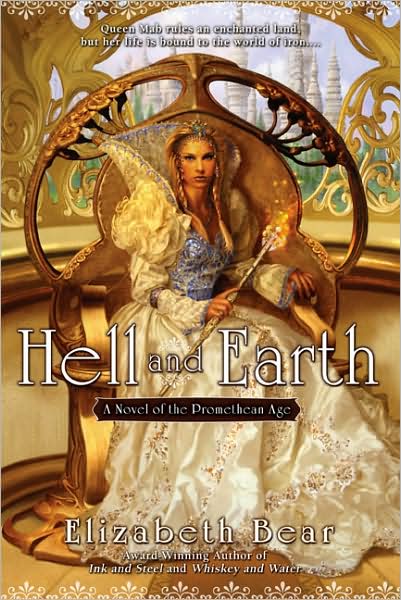
Ink and Steel was a novel that could stand entirely on its own. Sure, it lacked a true conclusion and only contained three of the five acts of the story arc, but Ink and Steel was a satisfying novel on its own. Hell and Earth is not that sort of a novel. Picking up the story threads in Act Four Elizabeth Bear assumes that the reader has already encountered Ink and Steel. Hell and Earth requires it. This is not a knock on the novel as both Ink and Steel and Hell and Earth were originally conceived as a single volume, The Stratford Man. Bear does not spend time reintroducing Kit Marley and Will Shakespeare or setting up the story. Bear says “go” on page one and the reader has to keep up. Keeping up is easy enough if one has already read Ink and Steel. If not, well, stop reading now and go find a copy of Ink and Steel.
Now that everyone is back on the same page, let us return to Hell and Earth. Elizabeth Bear picks up the strands of the story where she left off in Ink and Steel. Will Shakespeare has returned to London after a sojourn in Faerie. He has medicine from Morgan le Fey which will help him stay stronger for longer. Master Shakespeare, you see, is suffering from the same wasting disease which afflicted his father. This is important because any time Will wishes or needs to get physical, to use his strength, he has little enough remaining and must use his strength to hide his weakness from his enemies.
Kit Marley finally chooses to take an active role in the politics of Faerie, to become a player rather than one who is played. In doing so Kit will learn the true reason why he was targeted by Richard Baines and why he continues to be tormented. Kit spends more time back in the human world in Hell and Earth than he did in Ink and Steel, and the novel is stronger for placing Kit Marley more into the mix. Ink and Steel had more of the individual storylines of Kit and Will. Hell and Earth has the feel of truly moving the story inexorably towards an ending which is sure to be as shocking and unexpected and still natural as any reader might hope for. This is the promise Elizabeth Bear makes with her readers by writing such an extraordinary and brutally honest novel. This is the trust the reader should have for Elizabeth Bear's storytelling. At no point will Elizabeth Bear betray the reader by betraying the basic natures of her characters and nowhere is this more true than in her dual leads: Kit Marley and Will Shakespeare. Once the reader gets a feel for the characters every subsequent action feels natural and necessary, as if there were no other choice the characters would make in a given situation. Despite this, Hell and Earth scarcely feels predictable.
Predictable does not show off beauty and predictable does not deliver the sweetest pain to be found in surprising moments. Predictable does not offer beauty and pain and sadness all in the same passage.
Kit weighed the instrument of torture in his hands. "How brave are we, Meheil?"
:We are a very small angel, Sir Christopher:
He breathed through clenched teeth. "It's all right, Mehiel. We're a very small poet, too." - pg 291
Reading these lines on their own offers one idea of what exactly is occurring in this scene, and that idea would be damning in itself: Kit offering up an angel for torture while asking that same angel if it brave enough to deal with the torture. By itself this is a powerful sequence with the various things that can be read in those thirty seven words. Placed in the greater context of the novel, of everything that has gone before and anything that may come after, this sequence is one of the most powerful, beautiful, and sad sequences in the entire novel and one which lingers long after the page is turned.
Those thirty seven words are also representative of the skill and grace with which Elizabeth Bear tells the story of Hell and Earth. So much is packed into a small package and Hell and Earth is jammed full of these beautiful small packages.
Hell and Earth is more than the conclusion to Ink and Steel and it is more than the perfect complement to Ink and Steel, though it is both. Once the story gets rolling and readers catch up to what came before, Hell and Earth is an outstanding novel in its own right. It may not be able to stand entirely on its own feet, and given that it was conceived as part of a single novel this should be expected, but Hell and Earth is, pun intended, a hell of a book. Taken together with Ink and Steel, Hell and Earth completes an outstanding longer novel. The Promethean Age is one of the more exciting sequences in fantasy right now and we can only hope that Bear will be able to publish more of them.
Previous Reviews
Blood and Iron
Whiskey and Water
Ink and Steel
"The Girl Who Sang Rose Madder"
Hammered
Scardown
"Your Collar"
New Amsterdam
"Tideline"
No comments:
Post a Comment